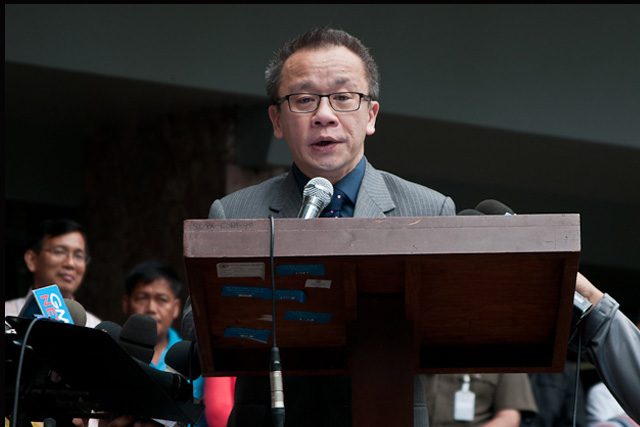
Veteran lawyer Theodore Te is receiving much praise following his decision to resign from his post as Supreme Court spokesperson on Monday morning.
Te in his letter addressed to Chief Justice Teresita Leonardo-de Castro expressed his desire to retire from his position as assistant court administrator and chief of the public information office of the high court.
The reasons he stated included his desire to return to the academe and to allow the newly-appointed chief magistrate “a free hand” in appointing a person who could craft media policies for her.
Laywer Maria Victoria Gleoresty Guerra will serve as acting chief of the public information office following Te’s recognition.
Some have taken the opportunity to praise Te for his work with the Supreme Court and his resoluteness in making the decision.
Another good man left the Judiciary. But I believe it was a perfect decision. Goodluck brother, Atty. Theodore Te.
I still pray that whoever's left with this administration will somehow someday turn the tides in favor of the Filipino people.
— ❎ Dondie C. (@CampDondie) September 3, 2018
‘Human rights lawyer and law professor, Theodore Te has resigned as the Chief Public Information Officer and Assistant Court Administrator of the Supreme Court’ @SCPh_PIO Source @rappler
That’s what men/women who highly regard integrity, delicadeza does. Rarity in gov’t. @TedTe
— Mike (@mikegam40) September 3, 2018
Some however have explained that Te’s decision is merely a formality, as his appointment was co-terminus with the term of ousted chief justice Maria Lourdes Sereno, who appointed him as assistant court administrator in 2012, his term being held over only until a new chief justice was appointed.
It’s a position which is co-terminus with the Chief Justice who made the appointment, so his leaving is not a surprise nor should be seen as an act of disrespect or defiance. It is good though to see him back in the world of advocacy.
— oli r. (@ohlistic) September 3, 2018
Te in May 2018 expressed his disagreement with the SC’s 8-6 decision granting the quo warranto position that ousted Sereno as chief magistrate.
Prior to his appointment in 2012, Te had a storied career as a law professor in his alma mater the University of the Philippines College of Law and as a human rights lawyer with the Free Legal Assistance Group.
He served as counsel of Leo Echegaray, who was convicted of raping his ten-year old stepdaughter and later sentenced to die by lethal injection in 1998. Echegaray was the first Filipino prisoner to be executed in 23 years.
Te criticized the execution, saying that capital punishment would only breed violence rather than deter it, reported The Guardian in 1999.









